



-
- Free Word Search




Compared to factories in other industries, chemical and material factories require a vast amount of floor space, and many precision devices and systems are constantly in operation. To ensure stable operation of these devices and systems and maintain productivity and safety, a stable supply of power using Uninterruptible Power Supplies (UPS) plays a vital role.
This article focuses on instrumentation systems and central monitoring systems, which are typical backup targets in chemical and material factories, and provides a detailed explanation of the UPS suitable for each and the performance and functions required.
An instrumentation system is a device that collects and monitors information from temperature sensors, pressure sensors, etc. This includes the function of measuring temperature, pressure, flow rate, etc. with measuring instruments and avoiding danger or automatically controlling equipment based on the data.
In large factories such as chemical and material factories, even a short stoppage of production equipment can have a significant impact on productivity and safety, so a large number of instrumentation devices are installed for each pipe or every specific distance (for example, 50 m).
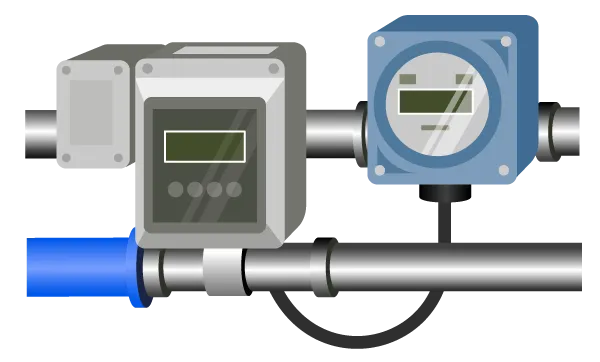
The shutdown of an instrumentation system due to a power outage or other power trouble can destabilize the production process, reduce product quality, and even pose a risk of serious impacts on safety. For example, if a pressure control sensor stops working properly, an explosion can occur, resulting in not only human and physical damage, but also the risk of releasing harmful substances into the surrounding area.
To ensure constant stable control in an instrumentation system, a UPS backup is essential.
The appropriate size UPS must be selected depending on the type and scale of the instrumentation system, but in most cases 1kVA to 3kVA, or at most 5kVA, will be sufficient.
When used in conjunction with an emergency generator, the backup time is about 5 minutes to make up for the 1 minute it takes for the generator to start up. When not used in conjunction with a generator, a backup of several tens of minutes to several hours is required until power is restored in the event of a power outage or other power outage.
Ease of maintenance is very important for UPS that backs up instrumentation systems. In chemical and material factories that cover a large area, a large number of measuring and control devices are installed for each pipe, for example, at specific distances (50 m). And the number of UPS units can reach several thousand in large factories.
In many factories, UPS maintenance is managed using spreadsheet software, and maintenance such as battery replacement requires a great deal of effort. In the case of a lead-acid battery UPS, the battery life is said to be 2 to 5 years, while the life of a lithium-ion battery is approximately 10 years *2. Since 10 years is equivalent to the expected lifespan of UPS equipment *2, it is possible to reach the time to replace the UPS without ever having to replace the battery, significantly reducing the amount of maintenance work required.
We also recommend this article: A thorough comparison of UPS lithium-ion batteries and lead-acid batteries!
In addition, UPS for measurement and control equipment requires high reliability and the ability to supply power without momentary interruption.
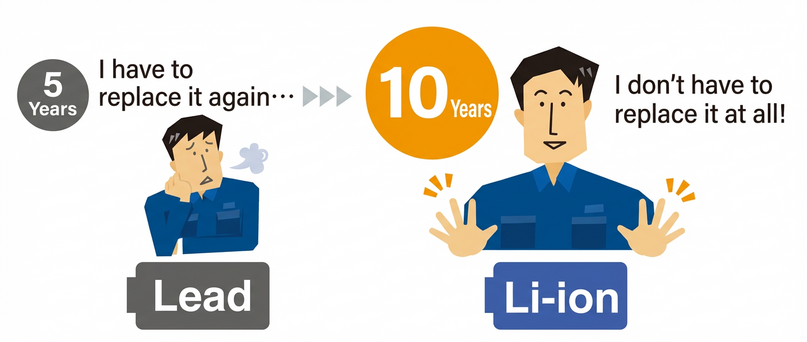 >
>
*1 When the ambient temperature is 25°C.
*2 For SANUPS A11K series.
This equipment bundles together various equipment in a factory, including measurement and control devices, to monitor and control the equipment. All equipment in the factory is monitored in a single monitoring room.
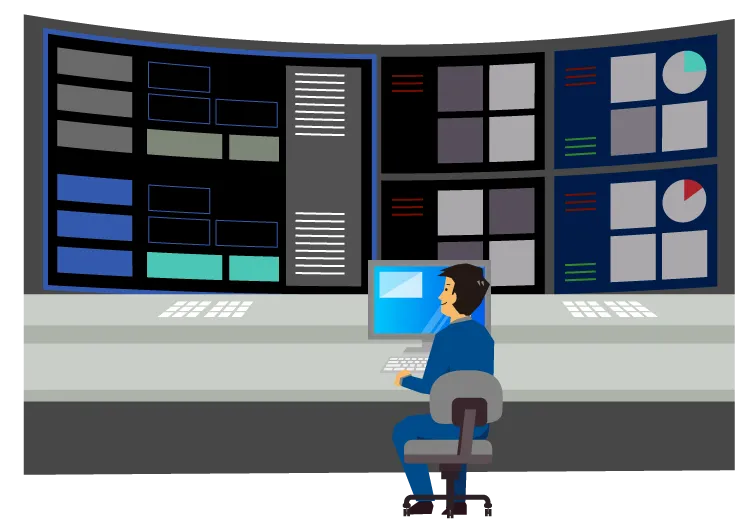
Chemical and material factories require constant monitoring and control due to the fact that accidents can cause enormous damage. The installation of UPS is important to prevent monitoring and control from being interrupted by power outages or other power problems.
The appropriate size UPS must be selected depending on the scale of the central monitoring system, but in most cases it is between 20kVA and 50kVA.
When used in conjunction with an emergency generator, the backup time is about 5 minutes to make up for the 1 minute it takes for the generator to start up. When not used in conjunction with a generator, a backup of several tens of minutes to several hours is required until power is restored in the event of a power outage or other power outage.
It is important for a central monitoring system to supply power without interruption during a power outage. For example, if the power supply is cut off during a power outage and the central monitoring system stops, there will be a period of time when the equipment in the factory cannot be monitored. If an accident occurs during that time, there is a risk of serious damage, so we recommend selecting a UPS that can supply power without interruption, such as Double Conversion Online or Parallel Processing.
Furthermore, if you use a parallel redundant type UPS, you can rest assured that even if one UPS fails, power can continue to be supplied from the other UPS.
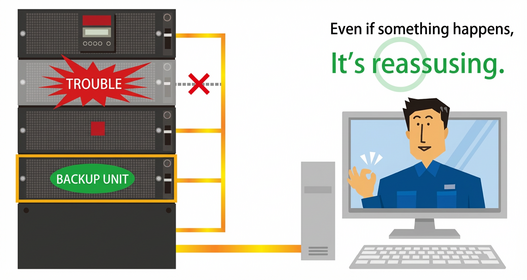
In addition, the larger the capacity of a UPS, the more power it consumes, so a UPS with Parallel Processing has good conversion efficiency and contributes to energy savings.
For example, when compared with the following 100kVA UPS, a UPS with Parallel Processing can save more than 3 million yen in electricity bills over 10 years.*3 In addition to the recent surge in electricity prices, the emissions trading system scheduled to begin in 2026 is also attracting attention, so the need for energy-saving UPS may become even greater in the future.
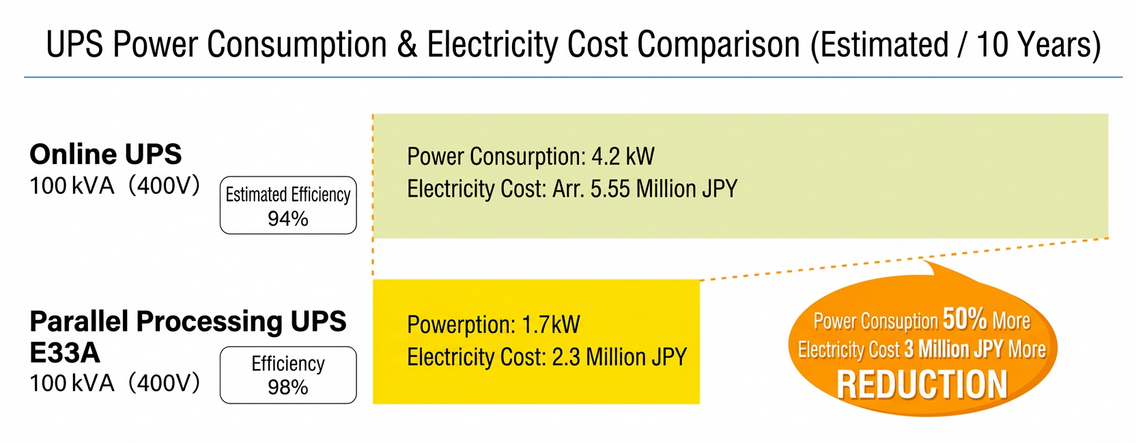
*3 Calculated at 15 yen (tax included) per kWh (estimated value as of April 2023)
The unit price for extra-high voltage varies depending on the contract, so please check the contract details.
Chemical manufacturer X (1,000-5,000 employees)
Company X, a chemical manufacturer, has installed measuring and control devices in each piece of equipment in each process in its factory, and by backing them up with UPS, the company is able to carry out safe and stable production activities. However, Company X had a problem.
Mr. S, who is in charge of managing and maintaining the production facilities, talks about the concerns he had at the time:
"We have several hundred UPS units in operation at our factory. I'm in charge of managing and maintaining them, but in fact we manage it all using a spreadsheet program, which is very time-consuming. Battery replacement maintenance is required for each UPS every two to five years. We record the date of the last maintenance and try not to neglect regular maintenance, but we don't just manage the UPS, so there's a lot to do every day..."
As the UPS was nearing the end of its life, Mr. X considered switching to a different model.
"While gathering information on the Internet, I came across an article about the differences between lithium-ion battery UPS and lead-acid battery UPS. I knew that SANYO DENKI manufactured UPS, but I contacted them out of curiosity, and discovered that they could solve the problem of UPS battery maintenance." (Mr. S)
Since then, Company X has been holding multiple meetings to discuss the replacement and is gradually implementing the switchover. Mr. S. shared his impressions as follows:
"The expected lifespan of the UPS we currently have installed is 10 years, and the battery life is also 10 years*4. This means that, in theory, we won't have to replace the battery even once for the life of the UPS. Previously, we had to replace the battery once every 2 to 5 years, but this has greatly reduced the amount of work required. We are very grateful."
*4 When the ambient temperature is 25°C.
Supervisor: Toshiyuki Nishizawa, Senior Sales Engineer, Sales Department, SANYO DENKI CO., LTD.
release date: